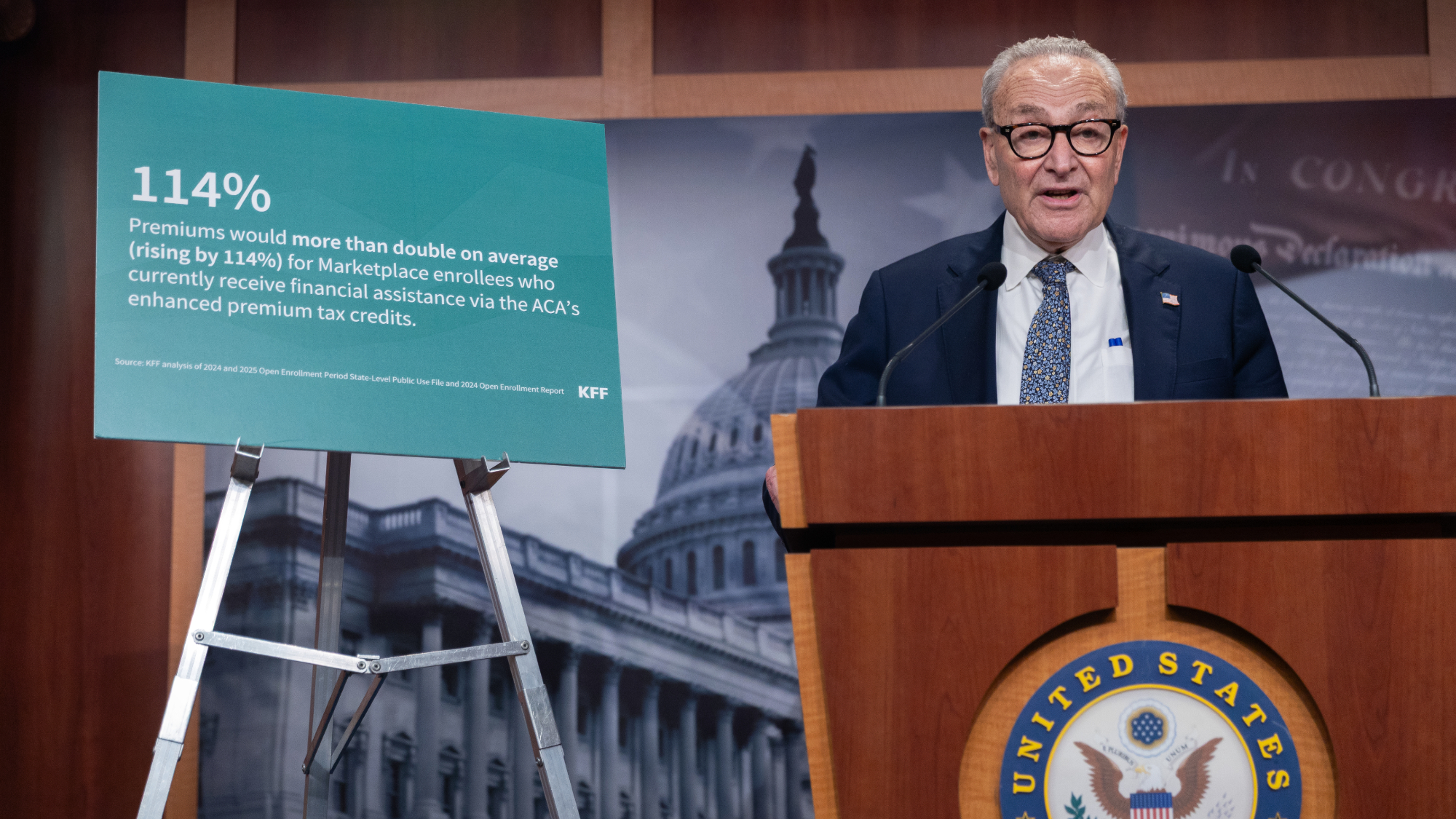US government shuts down amid health care standoff
Democrats said they won’t vote for a deal that doesn’t renew Affordable Care Act health care subsidies


A free daily email with the biggest news stories of the day – and the best features from TheWeek.com
You are now subscribed
Your newsletter sign-up was successful
What happened
Much of the U.S. government shut down at midnight after the Senate failed to approve rival stopgap spending measures. Democrats said they won’t vote for a deal that doesn’t renew Affordable Care Act health care subsidies for 24 million people; Republicans said they won’t negotiate during a shutdown. This is the 15th shutdown since 1981, the first since 2019 and the first full government closure — Congress has passed zero annual spending bills — since 2013.
Who said what
This “could be a long, grueling standoff,” with “no clear path out of the impasse,” Reuters said. After cursory negotiations with President Donald Trump earlier this week, The New York Times said, “lawmakers in both parties” spent Tuesday night “pointing fingers at one another for the coming crisis,” while Trump “issued threats from the White House, appearing to relish the prospect of a shutdown” he warned would be “bad” for Democrats.
“We can do things during the shutdown that are irreversible,” Trump said, “like cutting vast numbers of people out, cutting things that they like, cutting programs that they like.” His budget director, Russell Vought, has told federal agencies to prepare to fire some of the roughly 750,000 workers expected to be furloughed during the shutdown. Senate Minority Leader Chuck Schumer (D-N.Y.) said Trump’s firings probably wouldn’t hold up in court but his threats were an admission “he is using Americans as political pawns.”
Democrats have “put health care at the center” of their funding demands, Politico said, but “another motivation for not backing down” is Trump’s “snowballing efforts” to usurp congressional spending power. The White House has refused to spend billions of dollars approved and earmarked by Congress, and “nobody has any incentive to reach a deal if it’s not going to be honored,” said Sen Jeff Merkley (D-Ore.).
What next?
The White House has “broad latitude to determine which federal offices remain open and which are sidelined” during a shutdown, The Washington Post said. Trump’s immigration crackdown and “military deployments to major American cities will continue,” as will mail service and Social Security, Medicare and Medicaid payments, but many other “crucial government functions” will “shutter until lawmakers approve more money.”
The Week
Escape your echo chamber. Get the facts behind the news, plus analysis from multiple perspectives.

Sign up for The Week's Free Newsletters
From our morning news briefing to a weekly Good News Newsletter, get the best of The Week delivered directly to your inbox.
From our morning news briefing to a weekly Good News Newsletter, get the best of The Week delivered directly to your inbox.
A free daily email with the biggest news stories of the day – and the best features from TheWeek.com
Peter has worked as a news and culture writer and editor at The Week since the site's launch in 2008. He covers politics, world affairs, religion and cultural currents. His journalism career began as a copy editor at a financial newswire and has included editorial positions at The New York Times Magazine, Facts on File, and Oregon State University.
-
 The ‘ravenous’ demand for Cornish minerals
The ‘ravenous’ demand for Cornish mineralsUnder the Radar Growing need for critical minerals to power tech has intensified ‘appetite’ for lithium, which could be a ‘huge boon’ for local economy
-
 Why are election experts taking Trump’s midterm threats seriously?
Why are election experts taking Trump’s midterm threats seriously?IN THE SPOTLIGHT As the president muses about polling place deployments and a centralized electoral system aimed at one-party control, lawmakers are taking this administration at its word
-
 ‘Restaurateurs have become millionaires’
‘Restaurateurs have become millionaires’Instant Opinion Opinion, comment and editorials of the day
-
 NIH director Bhattacharya tapped as acting CDC head
NIH director Bhattacharya tapped as acting CDC headSpeed Read Jay Bhattacharya, a critic of the CDC’s Covid-19 response, will now lead the Centers for Disease Control and Prevention
-
 What is the endgame in the DHS shutdown?
What is the endgame in the DHS shutdown?Today’s Big Question Democrats want to rein in ICE’s immigration crackdown
-
 Witkoff and Kushner tackle Ukraine, Iran in Geneva
Witkoff and Kushner tackle Ukraine, Iran in GenevaSpeed Read Steve Witkoff and Jared Kushner held negotiations aimed at securing a nuclear deal with Iran and an end to Russia’s war in Ukraine
-
 Pentagon spokesperson forced out as DHS’s resigns
Pentagon spokesperson forced out as DHS’s resignsSpeed Read Senior military adviser Col. David Butler was fired by Pete Hegseth and Homeland Security spokesperson Tricia McLaughlin is resigning
-
 Judge orders Washington slavery exhibit restored
Judge orders Washington slavery exhibit restoredSpeed Read The Trump administration took down displays about slavery at the President’s House Site in Philadelphia
-
 Hyatt chair joins growing list of Epstein files losers
Hyatt chair joins growing list of Epstein files losersSpeed Read Thomas Pritzker stepped down as executive chair of the Hyatt Hotels Corporation over his ties with Jeffrey Epstein and Ghislaine Maxwell
-
 Judge blocks Hegseth from punishing Kelly over video
Judge blocks Hegseth from punishing Kelly over videoSpeed Read Defense Secretary Pete Hegseth pushed for the senator to be demoted over a video in which he reminds military officials they should refuse illegal orders
-
 Trump’s EPA kills legal basis for federal climate policy
Trump’s EPA kills legal basis for federal climate policySpeed Read The government’s authority to regulate several planet-warming pollutants has been repealed
